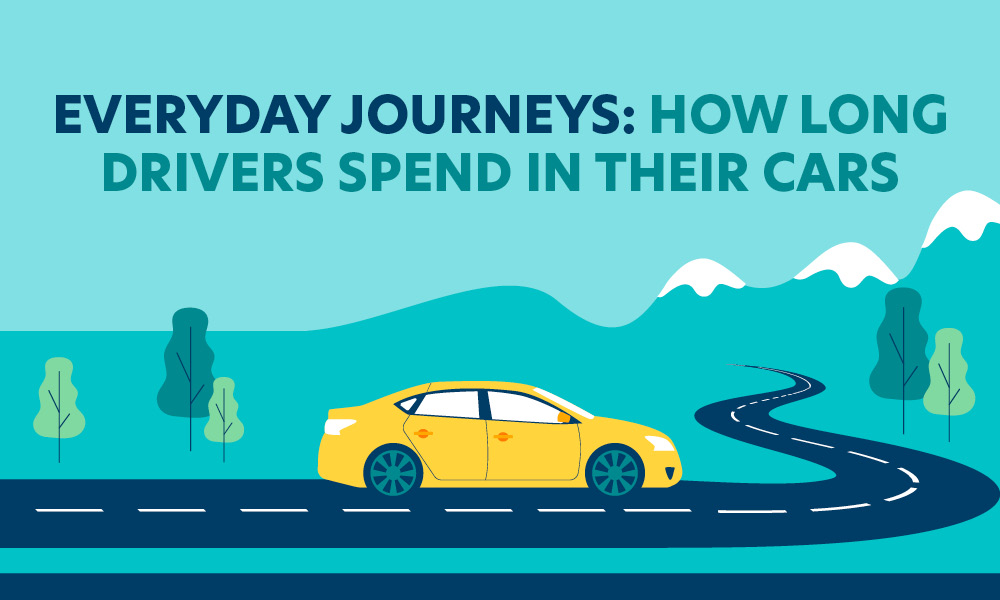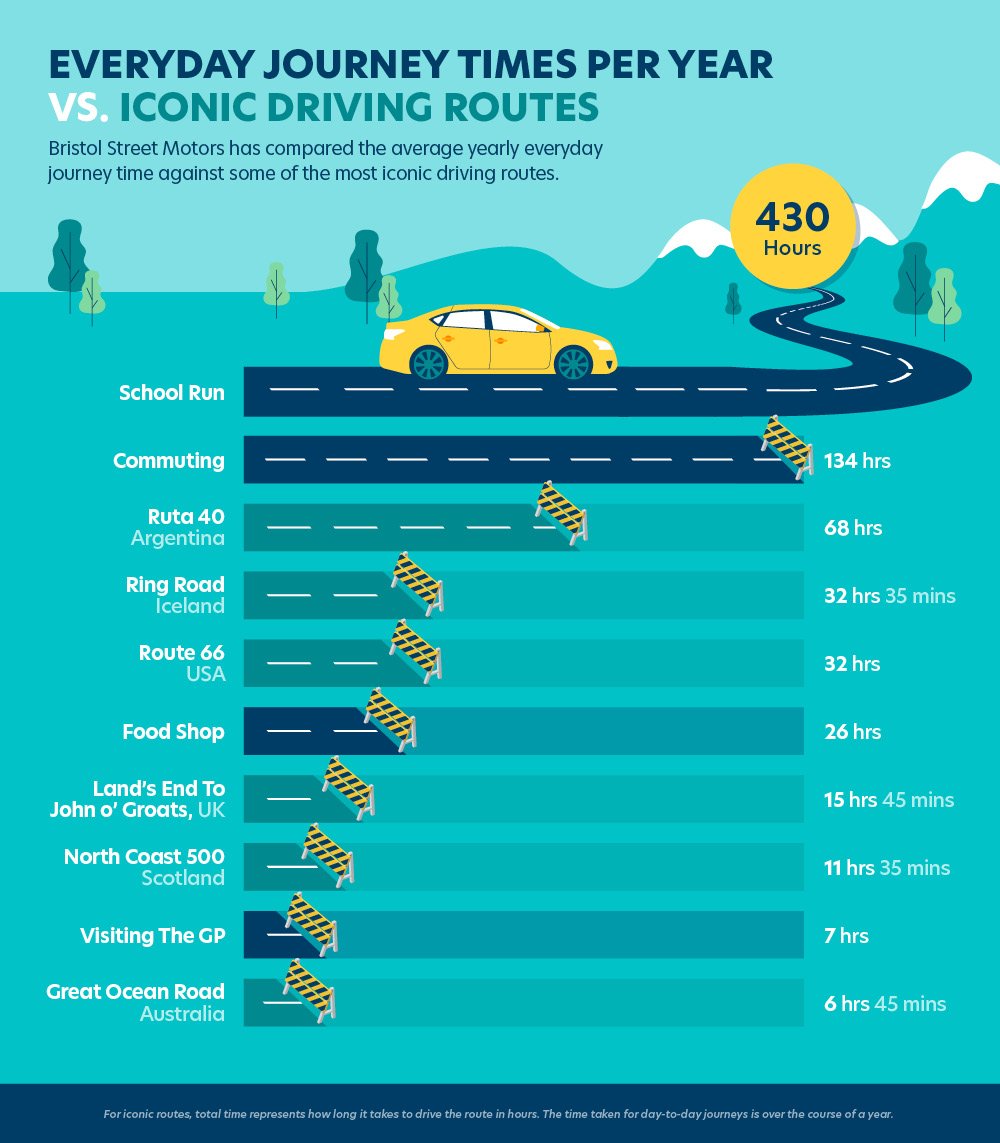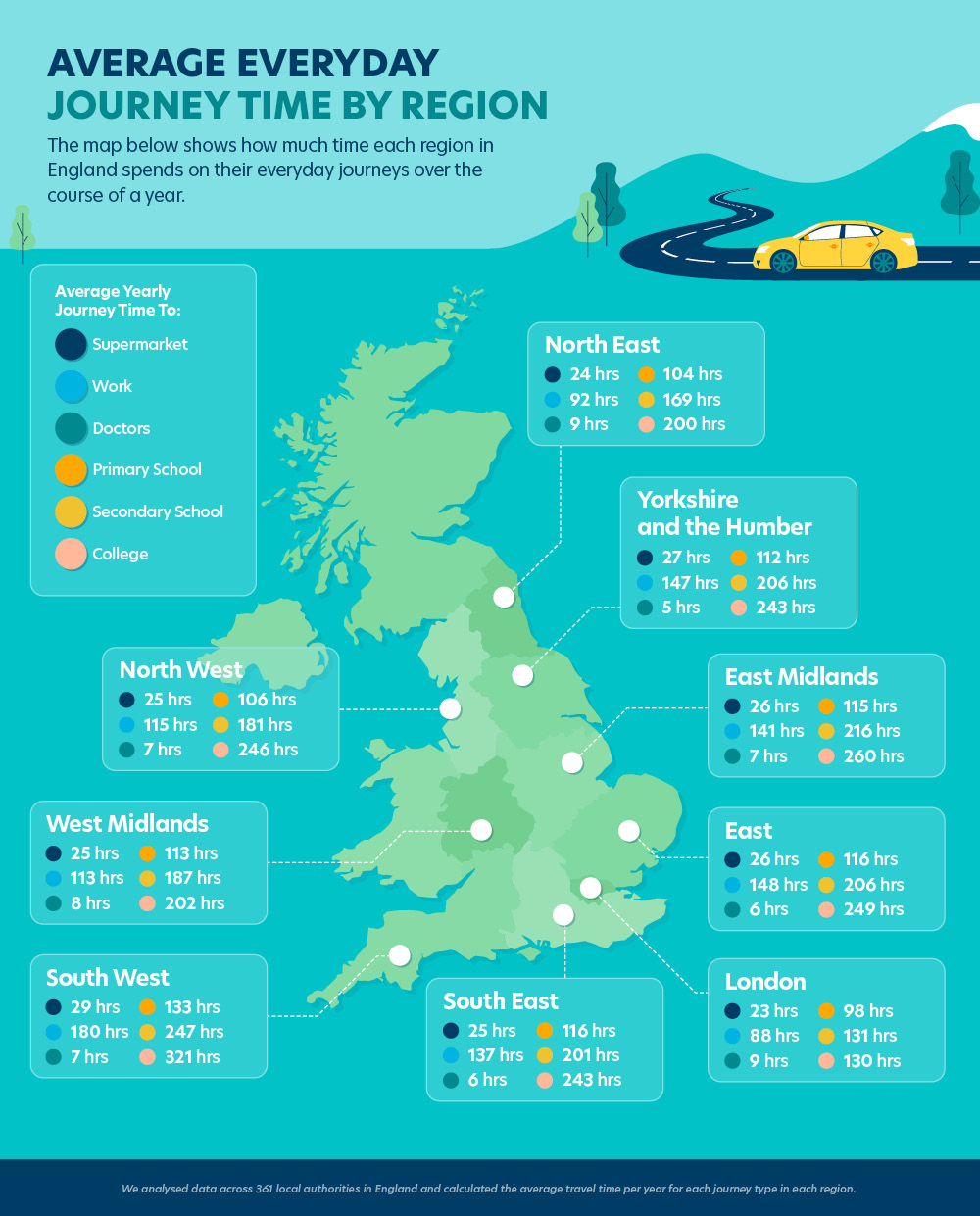Drivers in England Spend 25 Days Per Year In Their Cars

Contrary to what you see in TV ads and movies, only a small percentage of our driving time is spent on those epic road trips, where it’s just us, our cars and the open road.
Instead, a lot of the time we spend in our cars is on day-to-day journeys. Whether it’s dropping the kids off at school or doing the food shop, these smaller trips all add up, but just how long do they take?
We’ve crunched the numbers to reveal just how long we spend on everyday driving over the course of the year. To put it into perspective, we’ve compared the results to how long it takes to drive some of the world’s most epic routes.
Buckle up – the results may surprise you!
On average, we spend 597 hours per year on day-to-day journeys – that’s 25 days!
According to our analysis of journey time data from the Department for Transport, Brits spend a whopping 597 hours running around in their cars each year. This breaks down to:
- 430 hours journeying to and from schools and colleges
- 134 hours commuting to and from work
- 26 hours driving to and from the supermarket
- Seven hours visiting GP surgeries and hospitals
The time it takes the average driver to complete their yearly journeys is the equivalent of driving America’s iconic Route 66 over 18 times!

Isle of Scilly, East Lindsey and West Somerset spend the most time on daily car trips
Likely a result of the location’s island status, residents from the Isles of Scilly were found to spend the most time in their cars, with a whopping 2,774 hours or 116 days per year. This is the same as driving Land’s End to John o’ Groats just over 176 times!
In second place is West Somerset in the South West with 1,336 driving hours (56 days), followed by East Lindsey in the East Midlands with 1,299 hours (54 days).
With just 323 driving hours (around 14 days), residents of London’s Tower Hamlets spend the least time making more mundane journeys. However, with 15 London boroughs at the bottom of our research, this could be because residents are more likely to use alternative transport methods to get around the city.
Outside of London, drivers in Slough spend the least time in their car for day-to-day trips, at 401 hours (17 days). However, that’s still the same amount of time as it would take to drive America’s Pacific Coast Highway almost 14 times.

Parents spend 2,259 hours dropping their children off at school and college
It’s usually a quick journey every morning and afternoon, but add it up over the duration of a child’s education and parents are spending a significant chunk of time behind the wheel.
On average, parents will spend 2,259 hours dropping off and collecting their child from school and college, equating to 94 days in total over the course of a child’s education. Of this total:
- 797 hours (33 days) are spent on primary school drop-offs and pick-ups.
- 985 hours (41 days) are on trips to and from secondary schools.
- 477 hours (20 days) are on lifts to and from college.
By the time their child leaves primary school, a parent has driven the equivalent of Argentina’s Ruta 40, a 3,195-mile stretch of road, almost 12 times!
By the time the secondary school runs come to an end, a parent will have driven the equivalent of 30 times round Iceland’s famous 828-mile ring road.
Parents may expect their child’s dependency on lifts to wane as they enter further education, but our research shows that parents are still driving enough to cover Scotland’s North Coast 500 over 41 times!
South West parents spend 116 days doing the school run, the highest of all regions
There are some regional differences, too. Parents in the South West spend the most time on the school run, spending 2,777 hours on average over the course of their child’s education. Totalling 116 days, this is 22 days more than the national average.
Outside of London, North East parents spend the least amount of time running their children to school and back. Parents in the region spend 2,040 hours on average, equating to roughly 85 days.
In the capital, parents spend 1,570 hours (65 days). While significantly lower than the rest of the UK, this again could be down to a greater dependency on walking, cycling and public transport.
Brits spend almost 6 days every year commuting to work
Over the course of a typical year, our research shows we spend a total of 134 hours (almost six days) commuting to work.
Considering the average UK person will work for an average of 47 years, workers will spend 6,298 hours driving to and from work over their lifetime – a staggering 262 days in total!
The Isle of Scilly, Scarborough and East Lindsey were found to have some of the longest commutes, spending 37 days, 20 days and 18 days travelling to work and back over the course of the year respectively.
Omitting London results, Exeter, Oxford, Ipswich, Norwich, Watford, Stevenage, Cambridge, Lincoln and Knowsley spend the least time commuting. Residents will spend 66.9 hours in total, which is just 2.8 days over the course of a year.
How to save fuel when travelling on short journeys
With fuel prices soaring in the UK, many drivers are looking for ways to save on fuel. Whether it’s the school run or doing the food shop, these trips are essential, so cutting them out completely is not an option.
However, by making some simple changes, you can make a tank of fuel last longer. Why not consider the following?
1. Drive smoothly and sensibly
Smoothly transitioning through your car’s gears could help you save on fuel. Pulling away quickly or over-revving the engine before you change gear could lead to unnecessary fuel consumption.
As a rule of thumb, always transition as quickly as possible to the highest gear within the speed limit of the road you’re travelling on.
While you may be tempted to speed to get to your destination quicker, doing so will increase your fuel usage and you’ll also run the risk of breaking the law. Research has shown that driving just 10mph more and hitting 80mph instead of 70mph could use up to 25% more fuel, so it’s well worth sticking to the speed limit.

2. Switch your engine off when waiting
Waiting outside the school gates for your child at the end of the day? Switch off your engine. Not only will it reduce the amount of fumes outside the school gates, you’ll also reduce your car’s fuel consumption.
If you won’t be driving for a minute or longer, switch off the engine. Even just 10 seconds of ‘idling’ could use more fuel than what’s needed to start your engine again!
3. Maintain your car
Keeping your car in good condition is one of the easiest ways to save fuel. Make sure your car is serviced regularly to ensure it’s in a road-worth condition and pay particular attention to your tyres.
Keeping your tyres inflated to the correct tyre pressure and ensuring they have the right tread depth will reduce the resistance between the tyres and the road, meaning your car uses less fuel.
4. Adjust your travel times
This next tip won’t work for everyone but if you can, see if you can travel at quieter points in the day. For example, heading into work for 9am will likely mean you’ll hit rush hour traffic and spend time idling in queues of cars.
With many businesses now offering flexible working, could you start your day working from home and commute to the office when the roads are quieter? Planning your journeys around the times when roads are quietest could reduce your fuel usage.

5. Combine journeys
Warm engines are more efficient than cool engines. If possible, try to combine your journeys as much as possible. For example, could you do the food shop on your way home from work, rather than making two separate journeys?
As our research illustrates, Brits spend a huge amount of time in their vehicle without even realising it. These figures are also without the longer journeys we make, such as travelling for staycations, so our total driving time will likely be even higher.
A spokesperson from Bristol Street Motors commented: “When we think of car journeys, we immediately think of the longer, road trip-style drives we do. But it's the shorter distance driving that takes up a lot of our time, with our research showing we spend nearly a month in our cars each year!
With the cost of living increasing, it's important to take the steps needed to save in these smaller car journeys if we can. Driving more economically and keeping on top of any maintenance our vehicles require can help us save fuel and prevent bigger problems developing that could cost more down the line.”
It makes sense then to invest in a comfortable, reliable car if we’re going to be spending so much time in it. Discover the range of new cars and used car models at Bristol Street Motors and find your perfect vehicle for every type of journey.
Methodology
To calculate the total time spent in cars during day-to-day journeys, we used journey time data from the Department for Transport for the following trips (there and back):
- Supermarket
- Primary school
- Secondary school
- College
- Workplace (based on distance to an employment centre with at least 5,000 jobs)
- Doctors
- Hospitals
Our calculations are based on the following frequencies:
- Visiting a supermarket twice a week.
- Driving to primary and secondary schools four times per day (there and back twice for drop-off and pick-up) for 190 school days per year. We assumed a child would visit a primary school for seven years and a secondary school for five years.
- Driving to and from college 182 times per year (based on 3.5 days of learning per week) for two years.
- Visiting the doctors 12 times per year, driving there and back each time.
- Driving to and from the hospital five times per year.
- Commuting to and from work for 223 days per year (251 working days minus 28 days holiday).
We analysed data across 361 local authorities in England and calculated an overall average. Travel time totals and averages were also calculated by region and by activity.
We calculated that the average person will work for 47 years, based on starting a job at 18 and retiring at 65.
